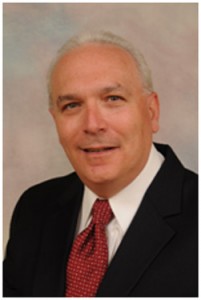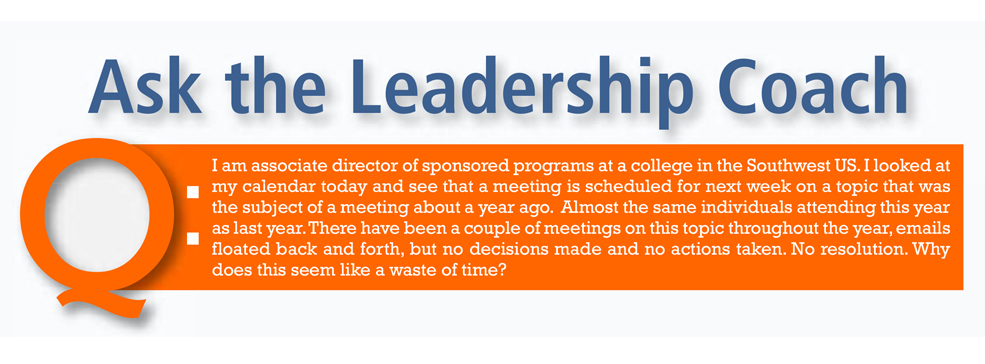I used to keep the following quotation from comedian Steven Wright on my desk: “Right now I’m having amnesia and déjà vu at the same time. I think I’ve forgotten this before.” My mirroring neurons1 are kicking in and I am finding myself empathizing with you about the phenomenon of endless meetings and non-decision making that sometimes occurs in our institutions and functions.
Many questions come to mind about the origins of the meetings: what is the nature of the topic, who is leading the meetings, what is their role and function, and who are the “stakeholders” for this issue. Is there a written charge for the meeting attendees (are they a committee, task force?)and what is the imperative or urgency to make a recommendation or decision? If I asked everyone individually who attends the meeting to describe what they see as the group’s purpose or mission, what would they say and would it be answered consistently? Sometimes institutions “park” tough issues in committees without any real expectations that a solution will emerge. The formation and meeting of a few people, then, is the action-response and a box is checked. I don’t know if this matter is in that species. Other interpretations are possible: maybe the meeting is intended to monitor an ambiguous policy or operational issues at your campus. The group’s purpose may be one of maintaining general aware-
ness…and that’s it. Overall, I am wondering what would happen if the meeting was cancelled for next week and hence forward: would anyone at yourcollege know orcare? Iamassuming that you havethesame question. What would your answers be to the questions I have raised? Are my ques-
tionsrelevant? What other questions would you raise? Would there bevalue for you or others to raise questions when you next meet?
From a leadership coaching perspective, you are my “client” for the remainder of this article, so let’s focus a bit on you and where you find yourself in this situation. What have you learned about your institution, about leadership, about yourself? How might this situation relate to your own future development as a leader? I wonder if you would be willing to experiment a bit and use this experience as a learning exercise. What would you say if I suggest to you that you consider recording your thoughts and feelings and lessons learned about this situation in ajournal? Maybe you will enjoy doing this and be willing to keep a journal as you develop in leadership? Let’s take as light detour and talk about the merits of journaling.
“Want to be an Outstanding Leader? Keep a Journal” is an article written by Nancy Adler in Harvard Business Review-Management Tip, January 13, 2016. The purpose of keeping a journal is to gather insights, self-reflections, to record your own reactions and perceptions, nd to learn about what “triggers” you. Adler suggests the following questions to begin a journaling experience:
- How am I feeling right now?
- How am I feeling about my leadership?
- What deserves my highest-quality attention:
• in my leadership? • in my life? • in the world? - What is the most outrageous (or fun or novel) idea I’ve heard in the last 24 hours? What do I love about it?
- What is the most exciting initiative I’ve heard about this week that is happening outside of my industry or in another part of the world?
- What contributed most to my happiness this week (or to the happiness of my people)? How can I have more happiness in my life?
I suggest journalingasa way to capture the learning from this situation and others you will encounter on your leadership path. You could use a journal to record your own impressions and observations and attempt to answer some of the questions raised earlier.
What is intriguing to me is to think of you in a future senior role at your institution or elsewhere, when you have the opportunity to “call the shots,” to make decisions or take actions like those you are experiencing in this situation. Having a journal will be a tool for you then, to recall your past experiences, and help you to ground your leadership values and aspirations.
 Garry Sanders is an executive coach and graduate of Georgetown University’s Certificate Program in Leadership Coaching. Garry is a long-time research administrator and recipient of NCURA’s Distinguished Service Award. He can be reached at gsanders@assistleadership.com and (518) 588-0992.
Garry Sanders is an executive coach and graduate of Georgetown University’s Certificate Program in Leadership Coaching. Garry is a long-time research administrator and recipient of NCURA’s Distinguished Service Award. He can be reached at gsanders@assistleadership.com and (518) 588-0992.

